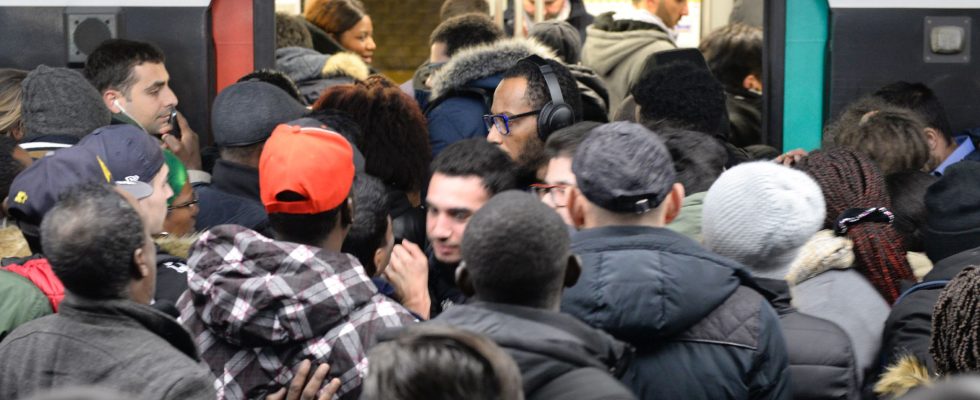The first president of the Court of Auditors does not mince his words in front of the press. Wednesday October 18, former Minister of the Economy Pierre Moscovici presented the conclusions of the report of his public accounts control body concerning the Regional Express Network (RER).
Responsible in particular for verifying the proper management of the five lines (A, B, C, D and E) of the Ile-de-France rail public transport service, the Court signs a critical report towards its operators: the performance of the RATP and SNCF are considered “unsatisfactory”, particularly on line B. Criticisms based in particular on dilapidated infrastructure and a deterioration in punctuality, despite traffic increasing each year.
A degraded service despite a constant increase in traffic
“It’s a clearly mixed assessment,” summarizes the first president of the Court of Auditors. If the report generally spares line A of the RER, “which has benefited from numerous investments” according to Pierre Moscovici, “lines B and D, which have high traffic, a mediocre punctuality rate and a predictable increase in ridership, are the most worrying,” he said.
Thus, the Court notes that these two lines are “saturated” while “their traffic has increased by 2% per year since 2010”, describes the report. This capacity cap particularly affects the RER B, the second largest railway line in Europe in terms of ridership, after the RER A, with more than a million daily passengers. A line which connects the north-east and south-west suburbs of Paris via the center of the capital.
An Achilles heel, however, already identified by RER managers. The day before the publication of this report, the three companies in charge of the network (Ile-de-France Mobilités coordinates and finances, while SNCF and RATP provide the service) had announced a series of measures to resolve the deterioration of the punctuality of the RER B, “overdue” according to the LR president of the region Valérie Pécresse.
And this, without waiting for the major upgrading operation planned for 2031. In reaction to the report of the Court of Auditors, Ile-de-France Mobilités (IDFM) thus regrets “that the court underestimates or does not take into account a certain number of concrete actions and efforts already undertaken”, in particular on cleanliness, accessibility or traveler information. IDFM also recalls that the punctuality of “all RER lines” has been “clearly improving” since 2016, “except line B”, recognizes the company.
Infrastructure and organization deemed unsuitable
Behind these management problems, the Court of Auditors considers above all that the divided operation of line B is “unsuitable”. The RER B is effectively divided in two: the SNCF operates the northern part, while the RATP takes care of the southern sections. A system deemed “too complex, even illegible” by the report.
Overall, “the RER suffers from a certain underinvestment, characterized by delays and insufficient infrastructure maintenance,” deplores Pierre Moscovici. The report thus recalls that certain trains date from the 1980s and that certain catenaries are a hundred years old. A dilapidation recognized by the director of RATP rail services, Agnès Ogier, during the announcements on Tuesday October 17. Valérie Pécresse highlighted on this occasion the investments underway to renew the trains and automate lines B and D before 2031.
For Pierre Moscovici, it is a “necessity, even an emergency” for Ile-de-France Mobilités and its two operators to “invest jointly” in the modernization of these infrastructures. He also pointed out the lack of “direct responsibility” of SNCF Réseau in infrastructure maintenance. This entity, independent of the SNCF, is normally responsible for the maintenance of French rails. To remedy this, he recommends “contractually” associating this subsidiary with IDFM, via a form of financial incentive.
In response to the Court of Auditors’ report, Ile-de-France Mobilités “deplores” the fact that a “contract with SNCF Réseau cannot be established”, considering that this would be an effective means “to accelerate the renovation work of the railway infrastructure in Ile-de-France”. A statement which highlights the difficulties of communication between the different entities.
Satisfaction surveys far from the real feelings of travelers
In its report, the Court of Auditors also considers that the RATP and the SNCF must change the way they conduct their obligatory annual satisfaction surveys among travelers. Indeed, after having itself questioned 4,000 regular travelers, the Court noticed that the satisfaction rates reported were “more modest” than in the operators’ surveys, with the latter not giving enough weight to the punctuality and frequency of trains.
These surveys condition part of the bonus-malus granted to RER operators, depending on their compliance with punctuality or accessibility objectives, these changes in methodology should therefore have “an impact” on their financial aid, warns Pierre Moscovici. The Court of Auditors pleads for “a new organization, adapted to a line logic” and “without waiting for the opening to competition” imposed by European law by 2040.
